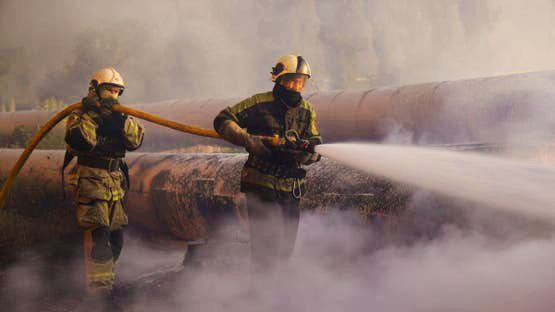Various regions of Ukraine experienced a violent night of military escalation, with loud explosions reported in the Dnipropetrovsk, Sumy, and Poltava regions, resulting in severe damage to critical infrastructure and widespread power outages, according to official local sources.
In Dnipropetrovsk, the "Obshchestvennoye" newspaper reported explosions this morning, Wednesday, without precise details about the extent of the damage or casualties.
In the Sumy region, regional administration head Oleg Grigorov announced via his Telegram channel that a series of explosions last night caused significant damage to several infrastructure facilities, in addition to power outages in parts of the region.
Grigorov added that "emergency services are currently working to contain the situation and restore essential services."
In Poltava, a large fire broke out at an energy sector facility following a series of violent explosions.
Regional administration head Vladimir Kohut explained that the fire destroyed the administrative building of the facility and several vehicles and vital equipment, and also caused power outages for many homes.
He confirmed that the fire was later extinguished and power was restored.
Meanwhile, the Russian Ministry of Defense announced a field escalation deep within Russian territory, confirming that its air defense systems destroyed 26 Ukrainian drones during the night, in the airspace of Rostov (15 drones), Oryol (4), Belgorod (3), and two drones each in Bryansk and Kursk.
Moscow considered this attack part of Kyiv's "ongoing attempts to destabilize security within Russian territory."
On the diplomatic front, the prospects for a political solution remain distant, despite multiple international attempts.
Russia and Ukraine held their first direct talks since 2022 in Istanbul earlier this year, resulting in limited agreements related to humanitarian issues, such as prisoner and body exchanges, without achieving any significant political breakthrough.
Recent U.S. efforts led by President Donald Trump also yielded no tangible results, despite two summits held in August, the first with Russian President Vladimir Putin in Alaska, and the second with Ukrainian President Volodymyr Zelensky and European leaders in Washington.
Moscow continues to impose strict conditions for ending the war, the most prominent of which is Kyiv's abandonment of the idea of joining NATO, and the concession of territories that Russia considers part of its "security zones."
In contrast, Ukraine firmly rejects these demands, describing them as unconstitutional and a threat to its national sovereignty.
The Kremlin has recently stated that it rejects any direct meeting between Putin and Zelensky unless it is preceded by concrete agreements at a minimum level, and it has categorically ruled out holding negotiations in Europe, describing EU countries as "not neutral" in this conflict.

